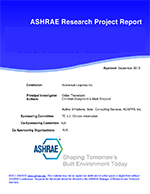While the thermodynamics of a run-around energy recovery system are relatively simple, it is critical that high-performance systems operate at optimum performance under varying operating parameters. With several variable input parameters (outside air/supply air/return air temperatures; air volumes; fluid volumes & temperatures), controlling and optimizing a system requires a numerical simulation based controller (‘performance mapping’) that allows variable amounts of heat transfer fluid to be circulated throughout the system. In multi-functional systems, additional heating and/or cooling is introduced into the fluid circuit, either to increase the heating/cooling capability of the energy recovery system from waste heat/cooling sources, or to control the supply air temperature to the building to eliminate separate heating/cooling coils in the supply air handlers. These features add yet another level of complexity to the controller function.
Product Details
- Published:
- 2012
- Number of Pages:
- 8
- File Size:
- 1 file , 1.3 MB
- Product Code(s):
- D-CCC12-29
- Note:
- This product is unavailable in Russia, Belarus


